Thierry's StoryPlease keep your thoughts and views coming in. Hundreds of people all over the world are reading this blog each week. This is a great place to get your voice and views heard.I want to know what you think. Have we learnt from our mistakes in the past or are we just making them all over again on top of new ones? What can we do about preventing genocide? What should we do? We start this week with a moving account that was written last week and sent to me from genocide survivor Thierry Kagabo.My name is Thierry Kagabo. During the Genocide I was 14 years old and living in Kicukiro, Kigali. I sought refuge in a convent near my home. I was with my sisters and younger brothers and many of our neighbours also hid there. We were around 30. We arrived there on the 7th April 1994 after our father had been killed.
The Interahamwes came there to kill, we had come here because we thought that we would be safe there. We then spent 6 days there until they came with the aim of killing people on the 13th.
I remember how in one room, as I was sitting there they shot 2 bullets, I remember, I was sitting there; they came down... I believe it was God's hand because it is beyond my human understanding, I don't understand it ! The bullets reached my feet just as they had lost impetus. I was fine and I did not have any problems... When I recall it, I thank God , because it was a miracle, I could have been killed.
They got people to come out of the rooms they had been occupying inside the convent, the nuns had provided us with more than 3 rooms in which to hide. They got us to leave in single file until we got to the road down there.
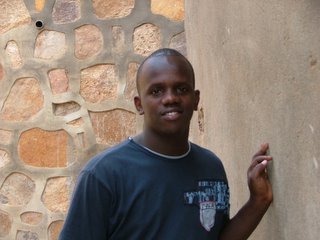
We all sat on the road and they chose some people who would be taken to be killed.
That is when they said that all the children should go back to the convent... How I personally escaped... I bent over slightly while climbing up the hill and prentended to be a child and ran back to the convent. That's how all the remaining adults were taken to the septic tank
nearby to be killed with clubs and machettes.
After the genocide, nothing really bad happened here. Most of us went back to the place where they'd been killed. They were in a pitiful state, the way they'd been buried... everyone was trying to bury them with dignity, we even built a tomb at the place where they'd been thrown.
This place... After the genocide, I rarely come here. Usually when I come here, I think back to the days when I lived here during the genocide, how we lived here...
The place that makes me become thoughtful and sad every time I get there is there, down the road. When I think about the day we were all sat on that road. When I think about the way we were all sitting down, the way they took us from here, in a line... Whenever I use that road, I become thoughtful, I think about the people who were murdered and I feel pain.
Making this testimony available to all kinds of people all over the world is very helpful for me. And in addition to that, future generations will learn from it how bad genocide is.
The fact that Aegis Trust struggles to prevent genocide is something that makes a lot of sense in my life. It helps me a lot.
Personally, I am assigned to teach the youth about the bad things that happened to us so that it may not happen again. I will never forget what took my family away... I know some people are planning for our better future but it's still hard for us to carry on.
-Thierry
Rwanda NOWToday is Holocaust Memorial Day and it is a time to look to the future. We should not forget the atrocities that have occurred in the past but we should look at where we are now and realise that in many countries these horrors still occur. We only need to look to Darfur to realise that people soon forget. Days like today are to help us remember but also to educate us, to make sure that this does not happen again.Today's post was contributed by Ken Barham, Trustee of Rwanda Aid and Former Anglican Bishop of Cyangugu, Rwanda (1993 to 2001)."It is important that people are made aware of the horrors of the genocide, but it is also important to bring to the forefront, the situation in Rwanda NOW. Rwanda is no longer a dangerous place with gangs like the Interahamwe roaming about the country. I feel strongly about this because I have worked in one of the most vulnerable parts of Rwanda from September 1994 until 200
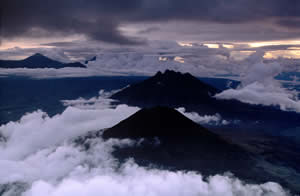
1 and then visited once or twice a year since then. I have watched the country move from total chaos in 1994, when all the banks were cleaned out and all government and other property taken, including my roof, doors, windows, cupboards etc; through sorting out administration, setting up commissions for Unity and Reconciliation and a Constitution, to elections at a lower level and then for Parliament and President. I was there last year in October and again in November and will be there again in May this year. Rwanda is incredible! The city of Kigali is being cleaned up remarkably. I have just come back from Honduras and seen rubbish thrown out all along the streets. President Kagame led his Ministers through Kigali picking up all the plastic bags and banning their future use. Trees and flowers are being planted everywhere and new buildings going up like mushrooms. In addition, Tutsi and Hutu are living and working side by side everywhere and nobody is going out to kill anyone (even if that feeling is still there for genocide survivors).
That horrific massacre happened in 1994. Those who have visited Rwanda recently will know the enormous effort that has been made, not only to restore the devastated country, but to move steadily from chaos to creative development, from devastation to democracy. Such strides have been made that inward investment has brought a brand new Five star Intercontinent

al Hotel to Kigali to match the Hotel Mille Collines and the Umubano Hotel, all of which are hosting international conferences. Rwanda NOW is a very safe and beautiful country. Scores of visitors go to see the gorillas in the mists of the mountains. Some of them travel to the National Park in the east to see a huge range of African animals. Some travel south to the university town of Butare and visit the National Museum. Wise people also continue on the tarmac road through the Natural Forest of Nyungwe with its thirteen types of primate, its rare birds and orchids. After the forest the country opens out to miles of beautiful green tea plantations before arriving at the small town of Kamembe in Cyangugu. Very wise people stay at the
Peace Guest House on the lakeside of the beautiful Lake Kivu! Here they can get a Rondavel with two bedrooms, sitting room looking at the lake, and bathroom with flush loo and hot shower. It is safe to travel anywhere in Rwanda today and it is a beautiful country, the Land of a Thousand Hills. Every visitor will get a very warm welcome. The genocide certainly happened and, of course, there are still deep scars, but the courts are dealing with justice. The three ethnic groups, the Hutu, the Tutsi and the Twa, live side by side in every village and town and work together in every business, and study together in every school and college. If ever there was a perfect example of Reconciliation, Rwanda is it! The people, the government Commission for Reconciliation and Unity, and the Churches, are all working at it.
If you want to prove it, go and see!"
-Ken Barham
Please keep sending in your thoughts and views.
Diane's Story
Today's post was written by a young Genocide survivor called Diane. This is the first of many testimonies which have been written by Rwandans specifically for this site. These testimonies are actually collected at The Genocide Memorial Centre in Kigali, which Aegis helped set up.
My name is Diane, I am 21 years old and I am a Genocide survivor. I want people to know that Genocide is really bad because it took away our parents, relatives and friends and left us with lots of scars.
Justice is really good because it punishes those who killed our people. Reconciliation is a good thing too but it's very hard - I just don't think you can easily forgive and reunite with someone who made you be what you are today.
Peace is the best I wish for the country. I wish not to be hurt in the future for what I am. I also wish to have a good life and be in the right position where my parents would be, I wish that no more Genocide happens in Rwanda again.
I would really love the government to punish the killers but mostly those who rejoice about our pain. Another thing I would request of the government is to help those who still have injuries and/or bomb fragments in their bodies getting medical care. I personally undergo serious physical problems due to fragments that I carry in my body everyday.
-Diane

The victims of Nyanza
General Roméo Dallaire TalksTonight, General Roméo Dallaire will be talking at an event arranged by 'Facing History & Ourselves' at The Royal Society of Medicine, London. Lieutenant-General Roméo Dallaire, now retired, was Commander of the United Nations Assistance Mission in Rwanda during the 1994 genocide. He now holds a post on the Canadian Senate. Since the publication of his book, 'Shake Hands with the Devil: The Failure of Humanity in Rwanda', General Dallaire has become a passionate spoke

sperson about the humanism necessary today in leadership and conflict resolution.
'Facing History & Ourselves' is doing extensive work in Rwanda currently helping them develop a new history curriculum and training hundreds of teachers to use it. You may know that 75% of the teachers in Rwanda were either murdered or imprisoned during the genocide so the rebuilding of the teacher network is essential.
General Dallaire and the work of Facing History challenge us to explore profound moral questions. What are the challenges of being given responsibility without authority? What are the consequences of a military person following his conscience instead of his orders? Are some lives worth more than others? How can we expand our "universe of obligation" to include people we don't know or even recognize? Why should we care about events that go on half way around the world?
A full report of the event will be posted later in the week.
Holocaust Memorial Day is on Friday and there are events going on all over the UK. If you want to get involved or want to know what events are taking place in your local area, click on the link
here and select your location.
I received a lot of messages over the weekend expressing support for our site and our aims. There is a genuine interest and concern and people want their voices heard.
This is a testimony from Apolinie Uwantege. It is a harrowing account of her ordeal during the genocide and I thank her for letting us publish it here.'We were a happy family and got along fine, but in 1990, classmates started to look at us differently, not nicely. Then the multiparty political system was introduced. Even though
we weren't involved with any party, people thought we were on the RPF side just because
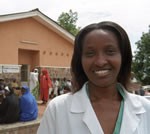
e we were Tutsi. Whenever we walked past, people would scream, "Oh, look at the inyenzi (cockroaches)."
On 6 April, we made our way to the Ecole Technique Officielle (ETO), where some people had already sought refuge with the UN. We had protection and felt safe, but on 11 April, the UN troops drove away. As they left, the Interahamwe and government soldiers came. They told us we would be taken to Nyanza. They made us run. Some people were praying, others singing. As we ran, some people were hacked with machetes and others killed. Many Interahamwe had come and there were buses full of soldiers behind us. It was evening and it had rained. We arrived at an open field in Nyanza, and could tell it was over. As we all stood there, we kept asking our father what would happen. I remember my oldest sister asking Mum if we would see each other when we got to Heaven. Mum didn't say anything; she was overwhelmed. Father kept on giving us hope that nothing would happen. They started shooting and we fell to the ground. After that, I never saw my father or mother again. Bodies fell on top of those of us who had fallen down first. They threw grenades into the crowd and kept on shooting for a long time until it was very dark. The Interahamwe started walking around hacking people if they were alive. I was with my older sister, younger brothers and some other young people. We had all agreed to keep quiet and pretend to be dead. They picked me up, wondering if I was alive or not. They hit me with something - I don't know what. I was hurt but kept quiet, so they threw me onto the ground thinking I was dead. They kept on going, hacking people. People were crying, calling for their mothers, shouting out, close to death. Eventually they realized it was too dark and left.
Next morning, we could see the Interahamwe coming. They started asking each other whether we were dead or not. One said, "Let me just show you." He started hacking people. There were about 15 of us. My little brother Bertin gave up and asked for forgiveness. They hacked him with a machete, and he died immediately. I was cut on the neck and leg. Felix tried to fight them and they cut his neck, fingers and feet. My older sister, Fifi and Bertin died immediately. Then they left.
The RPF was fighting to capture Rebelo, and they wanted to save the survivors in Nyanza. Those of us who could walk left, not really knowing where we were going. One day, at dawn, I heard footsteps. I thought it was the Interahamwe who had followed us, and I immediately shut my eyes. One of them stopped and told the rest to come and see the kids who had been killed there. One touched me. He said, "These kids are alive, feel them." We kept quiet, but we couldn't hold our breath long enough. They told me to wake up. I thought if I did, they would kill me on the spot. They kept on saying, "Wake up, we'll take you to hospital." Then I thought to myself that no Interahamwe could be so sympathetic, so I raised my head and looked at them. They were wearing RPF uniform.'
A longer version of this account is published by the Aegis Trust in 'A Time to Remember: Rwanda, ten years after the genocide'.
The coming weeks.
It's been a good first week on the Rwandan Survivors blog and I've had a great response from people who would like their views heard. Naturally I'll look through them all and try my best to put as many on the site as possible.
Next week I'll publish more testimonials, pictures, current news and forums and look at the build up to Holocaust Memorial Day.
The release of
SHOOTING DOGS is being closely aligned with work of The Holocaust Memorial Day Trust to help raise awareness of contemporary genocide alongside the commemorations of the Holocaust. Holocaust Memorial Day, which takes place next Friday (27th January) is about both the past and the present. It is about commemorating and continuing to learn from the events of the Holocaust and about relating those lessons to the ever-changing world around us. There will be a number of commemorative events taking place across the country throughout next week including a number of screenings of
SHOOTING DOGS. The film will also be showing at the main Memorial event in Cardiff on the 27th. Please visit
The Holocaust Memorial Day website for more information on their work and events taking place in your area.
The site is being viewed by people from all over the World so its a great place for you to voice your opinion and start a discussion.
We want to hear from you.This blog is a platform for anyone and everyone to write their views on the subjects raised.
Lets get people talking!
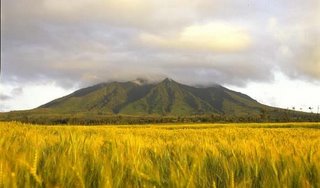
Mount Sabinyo - Rwanda
Today we post the first of our testimonies from survivors of the genocide.
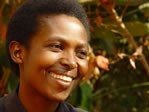
This account of the massacre and her survival from
Anne Marie Bucyana is a testimony to her great strength and courage.
I grew up in a loving home with my parents, two brothers and five sisters. In 1990, I married. My husband Jean-Marie and I had our first child, Patrick. After his birth, the authorities started persecuting the Tutsis. They arrested my husband, accusing him of being an RPF accomplice. He was jailed for two weeks, and after his release, fled to Kibuye. Me and my son followed after the interahamwe came looking for him. In 1993, I gave birth to my second child, a boy we named Iradukunda, meaning ‘God loves us’. This was where we were in April 1994 when Habyarimana’s plane was shot down.
When the killings began they came and took my husband away. Shortly after, I could hear those who took him away singing that they had killed a cockroach, and I knew he was dead. One soldier came up to the house. I was sitting with my baby boy on my lap. He grabbed the child and threw him against the wall. He died from the impact. I ran to pick up my baby’s body, but the soldier threatened me and told me to lie down. And there he raped me. I don’t really have the words to explain all that he did to me. At some point he heard a commotion, and ran off.
When he heard that I was still alive, Zacharya, a colleague of my husband’s came on a motorbike to take me away. I did not know that he had been involved in my husband’s murder, and thought that I would be safe with him. I took my son with me. Zacharya had taken many houses from Tutsis, and he took us to one of them in Safi Cyumbati, putting us in a room with Interahamwe. I remained at this house for six days, and was raped every night. At any time one of the Interahamwe wanted me, he took me – even in front of my son, who was with me.
At dusk on the sixth day, I was raped by two gangs of interahamwe. A third gang gave me a hoe and ordered me to dig my grave; they couldn’t be bothered to do it themselves. I was naked; they had already taken my sarong. I started pleading with them to shoot me, and not to kill me with a spiked club. They asked me if I knew the price of a bullet. While they were deliberating, another gang of interahamwe came. Because I was claiming to be a Hutu, their leader ordered the group to take me back to the house, and check my tribe in the morning.
As they were taking me back to the house, someone went and told an old lady whom I had helped in the past. Later that night she stole me away to her house and hid me and my son.
We started hearing rumours that the RPF were advancing and killing. Everyone started fleeing. I asked myself, why leave? But I had no reason to stay; so I decided to leave with them. But once we reached the Rusizi River, where we would cross into Zaire, I felt that they all had something in common, and I was on my own. I decided to stay in Rwanda.
When I learned I was infected with HIV/AIDS, I was shocked, confused, in denial. I felt worthless, I felt I was finished. That’s when I started to feel the trauma. I looked for something with which to commit suicide, but I couldn’t find anything. Ever since I found out I was ill I have never received any medication for my illness, not once.
I only half survived. I am still carrying death in me; not only the death that AIDS will bring. Others say they escaped from the sword, but the sword is still in my heart. Even in death, I do not believe I will find rest. Only my son gives me the strength to live. It is a miracle that I am still alive after ten years. If I can survive another two years, he will be a little older, and maybe he will have a chance in life; maybe he will not become a street child.
A longer version of this account is published by the Aegis Trust in ‘A Time to Remember: Rwanda, ten years after the genocide’.
Todays posting was sent to us by Mary Kayitesi Blewitt from the Suvivors Fund (SURF)
Survivors Fund (SURF)Between April and June 1994, more than 1,000,000 Tutsis and moderate Hutus were killed in the Rwandan genocide, the most intense period of killing in modern history. Eleven years on, survivors of genocide are struggling to piece together their shattered lives and cope with the many legacies of genocide.
I am one of the lucky ones. Despite losing most of my family in the genocide, I did not suffer the trauma of rape and abandonment that befell many Rwandan women. It is this vulnerable group, in particular those raped, deliberately infected with HIV and who are now dying from AIDS, that SURF has been focused on helping over the last year. Fortunately, through the assistance of the Department for International Development (DFID) we are now supporting 2,500 HIV+ women survivors with antiretroviral treatment.
This is the essence of SURF’s work, to rebuild a sense of self and trust in humanity for these people, destroyed by genocide through the infliction of excruciating physical pain and terrifying mental abuse. Since helping to set up SURF, nearly nine years now, we have helped survivors deal with and recover from the tragedies of 1994, supporting a wide range of services for victims in Rwanda, and assisting survivors in the UK. Funded by a variety of organisations and individuals, we act as a channel to distribute financial assistance through grassroots partners to bring hope, safety, and a decent standard of living for survivors.
Films like Shooting Dogs are playing an important role in raising awareness of the events of 1994. The release of the film comes at the right time for survivors, many who cannot help feeling that their stories had been long forgotten by the world.
As the film portrays, the events of 1994 were brutal with genocidaires actively involving the entire population. But what it is unable to showcase is the plight of survivors today. It is not a sad ending, neither a happy one, as the conclusion is still to be determined. Men were targeted first in the killings, so survivors are mostly women and children. Many women were gang raped by the interahamwe (those who killed together), who knowing that they were HIV+ used sexual violence so survivors would live only to die slowly from AIDS.
The reality for women survivors in Rwanda is an ongoing concern, as they must live side-by-side with men who raped them and killed their families, as the perpetrators of the genocide are being released back into the community. The country no longer has the resource to continue to keep these men inc
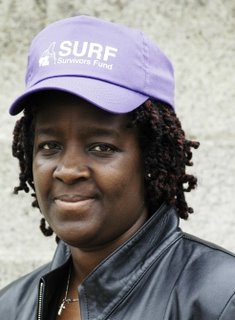
arcerated, and so by admitting guilt at a local gacaca (community-based) trial they are now free.
Survivors have received no justice - they now face harassment and intimidation from these very people. There is no simple way of redressing the balance, but by securing access to antiretroviral treatment then at least women survivors can look forward again to a future. Meanwhile SURF in 2006 will raise the profile of rape as a weapon of war, and call for action to stop the verbal and physical abuse, and in recent cases, murder, of survivors for giving testimony to gacaca courts.
For more information, please visit:
www.survivors-fund.org.uk-Mary Kayitesi Blewitt
Welcome to the Rwandan Survivors
In the summer of 2004 we went to Kigali to make the film Shooting Dogs which tells the story of what happened at the Ecole Technique Officielle during the Rwandan genocide. It was an extraordinary experience for all of us. For five months we shared rich experiences and made lifelong friendships with our Rwandan friends who made the film with us. We all learnt much about Rwanda - its history and its struggle to move beyond its recent tragic past.
We hope that the film will spark debate and this site is an opportunity to join in and contribute. We really want to hear from as many voices as possible: to tell us what you think and to open up the discussion so that all of us can share our stories.
We have two blog sites running. This blog will feature testimonials from the survivors of the genocide courtesy of Aegis and Surf. Our other site (
Shooting Dogs) will take a closer look at the film itself and how we made it. There you will find diary entries from the production crew, as well as trailers, photos and much more.
These blogs will function as interactive forums for people, survivors in particular, to post their views. This is a platform that will offer a voice to the survivors that take part. We will have input from survivors still residing in Rwanda, some of which made up the film's cast and crew, from journalists that were present in Rwanda at the time of the genocide, as well as testimonies and comments from survivors living in the UK.
We hope that the film itself, partnered by the blog sites, will function to keep the Rwandan genocide, and indeed, other genocides/crimes against humanity, in the public consciousness.
-David Belton (Producer)
This site launches on the 16th January 2006 in conjuction with the 'Shooting Dogs' blog.
We aim to bring together survivors of the Rwandan Genocide of 1994 and create a discusion linked to the new film 'Shooting Dogs'.
This site will include testimonials from survivors and a database of resources for people to use.










